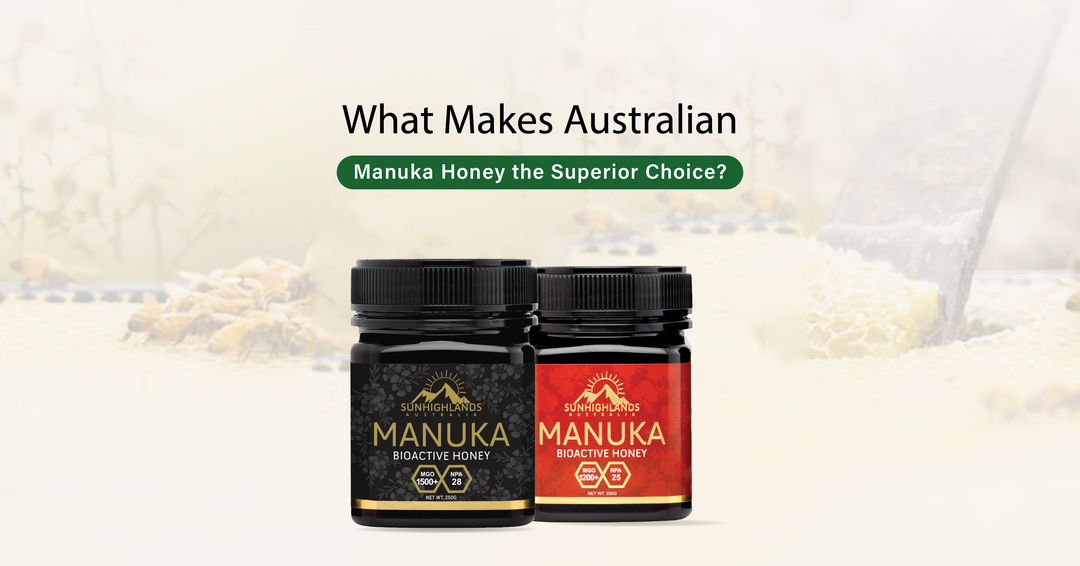Can Manuka Honey Help with Eczema?

Eczema, also known as atopic dermatitis, is a chronic skin condition characterised by red, itchy, and inflamed patches on the skin. While there is no permanent cure, it is treatable. The symptoms can significantly impact an individual's confidence and comfort, with severe cases presenting additional symptoms such as yellow crusting, fluid-filled blisters, open sores, swollen skin, and warmth in affected areas.
Traditional Treatments for Eczema
Eczema treatments often include:
- Moisturisers and Emollients: To keep the skin hydrated.
- Topical Steroids: Creams and ointments containing corticosteroids to reduce inflammation and itching.
- Antihistamines: To reduce discomfort and itching.
- UV Light Therapy and Wet Wrap Therapy: Under medical supervision.
- Injectables: In severe cases, to boost immunity.
Can Manuka Honey Help Eczema?
Manuka honey, derived from the nectar of the Manuka bush, is celebrated for its unique antibacterial, antimicrobial, and anti-inflammatory properties. It’s packed with Methylglyoxal (MGO), a compound not found in regular honey, which contributes to its potent healing abilities. Here’s how Manuka honey can aid in managing eczema:
- Moisturising Properties: Manuka honey helps lock in moisture, keeping the skin hydrated and reducing dryness.
- Anti-Inflammatory Effects: Its anti-inflammatory properties help reduce swelling and redness.
- Antibacterial Properties: Manuka honey can help prevent infections in broken skin, promoting faster healing.
Ways to Use Manuka Honey for Eczema
Direct Application:
- Apply a thin layer of Manuka honey directly onto the affected area.
- Leave it on overnight or for at least 1 hour.
- Rinse off with lukewarm water and apply a mild toner such as rose water.
Manuka Honey Bath:
- Add 2 tablespoons of Manuka honey to your bathwater.
- Keep the water temperature around 36-37°C to avoid irritation.
- Soak for at least 20 minutes to benefit from the honey’s medicinal properties.
Manuka Honey Face Mask:
- Mix Manuka honey with soothing ingredients like oatmeal or aloe vera gel.
- Apply the mixture to the affected areas.
- Leave on for 15-20 minutes, then rinse off with lukewarm water.
Manuka Honey Moisturiser:
- Mix Manuka honey with coconut oil to create a hydrating moisturiser.
- Apply the mixture to the affected areas after showering or bathing to lock in moisture and soothe the skin.
Precautions and Tips
- Consult a Physician: Before using any DIY recipes, especially if you have sensitive skin or severe symptoms.
- Patch Test: Perform a patch test to ensure you don’t have an allergic reaction.
- Quality Matters: Use high-grade Manuka honey with a UMF rating of 10 or higher for the best results.
Conclusion
Manuka honey offers a natural and effective approach to managing eczema. Its unique antibacterial, anti-inflammatory, and moisturising properties make it a valuable addition to your skincare routine. Always ensure you use genuine Manuka honey with the appropriate MGO rating for maximum benefits. For the best quality, visit Sunhighlands Australia's Manuka honey stores and give your skin the special treat it deserves. Stay connected, stay blessed!
FAQ’s
Q: Can Manuka honey help with a sore throat?
A: Yes, Manuka honey’s anti-inflammatory properties can reduce swelling and irritation, helping to alleviate a sore throat and promote restful sleep.
Q: Does Manuka honey provide an immediate source of energy?
A: Yes, due to its fructose and glucose content, Manuka honey acts as an immediate source of energy.





